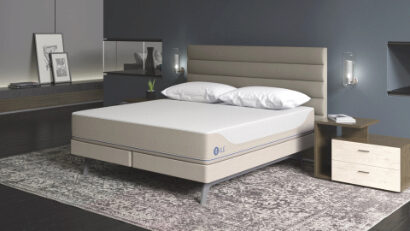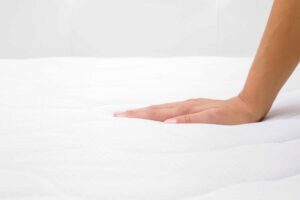Mattress Firmness Guide
Disclosure: By clicking on the product links in this article, Mattress Nerd may receive a commission fee at no cost to you, the reader. Read full disclosure statement.
When shopping for a mattress, one of the most important factors you should consider is mattress firmness, as it has a huge impact on your overall sleeping experience.
In case you’re wondering, mattress firmness is how soft or firm a mattress feels to an individual, which reflects the level of support and comfort a mattress can provide. Choosing the right firmness level ensures that you’re getting proper support, optimal comfort, and adequate pressure relief.
In this guide, we’ll walk you through everything you need to know about mattress firmness, including the different firmness levels, which level best suits certain types of sleepers, and how you can find the mattress that’s tailor-fit to your needs and preferences.
How is Mattress Firmness Measured?
In the mattress industry, we use a standardized “mattress firmness scale” as a way for manufacturers, retailers, and even us mattress connoisseurs to talk about firmness in a consistent manner. The mattress firmness scale goes from 1 to 10, with 1 being the softest and 10 being the firmest.
When it comes to determining the exact firmness level, there’s no single answer. Instead, it’s a combination of factors like materials, construction, and user feedback. It’s important to remember that mattress firmness is somewhat subjective.
What may feel like a 6 (medium-firm) to one person might feel like a 7 (firm) to another. That’s why manufacturers (and mattress reviewers!) often test mattresses with different types of sleepers to gauge how firm the mattress feels, taking into account different body types, sleep positions, and personal preferences.
Mattress Firmness Scale
Each mattress’s firmness level corresponds to a specific description of the mattress’s feel. Here’s a breakdown of the mattress firmness scale we use here at MattressNerd:
1-2: Very soft
3-4: Soft
5-6: Medium
6-7: Medium-firm
8: Firm
9-10: Very firm
Which Mattress Firmness is Best?
When it comes to choosing the best mattress firmness, there’s no one-size-fits-all answer. Your ideal mattress firmness depends on various factors, including your sleeping position, body type, age, and pain concerns. Let’s take a look at these factors and discuss them in more detail:
Sleeping Position
- Back sleepers: If you’re a back sleeper, you’ll typically benefit from a medium-firm mattress. This level of firmness provides a good balance of support and comfort, ensuring proper spinal alignment while still allowing for some contouring around your hips and shoulders. A mattress that’s too soft may cause your hips to sink, leading to lower back pain, while a mattress that’s too firm might not offer enough pressure relief.
- Side sleepers: Side sleepers need a mattress that provides ample pressure relief for their hips and shoulders. A medium to medium-soft mattress is usually the best choice, as it allows for adequate contouring while still providing enough support for proper spine alignment. If you sleep on your side, avoid mattresses that are too firm since they can’t relieve your pressure points properly. Also, don’t go for a mattress that feels too soft since you may not get enough support for your shoulders and hips, leading to spinal misalignment.
- Stomach sleepers: Stomach sleepers will need a firmer mattress to prevent their hips from sinking too much, which could lead to lower back strain. A medium-firm to firm mattress can help keep the spine aligned and provide the necessary support. Don’t go for a soft mattress, as there’s a high chance your hips will sink too far in, blowing out your back out of alignment.
- Combination sleepers: Combination sleepers change positions throughout the night, so they’ll need a versatile mattress that can adapt to their movements. A medium to medium-firm mattress is a great option, as it provides a good balance of support and comfort for various sleep positions. For extra comfort, they can also opt for a mattress with good motion isolation and responsiveness so there’s less disturbance when shifting positions.
Body Type
- Lightweight sleepers (below 130 lbs): Lightweight sleepers will probably feel more comfortable in softer mattresses, as these provide better pressure relief and contouring. A soft to medium mattress will usually offer the best balance of support and comfort for individuals weighing under 130 lbs. Firmer mattresses may feel too hard on the body and may not offer enough body contouring, leading to discomfort and poor spinal alignment.
- Average-weight sleepers (Between 130 to 230 lbs): Average-weight sleepers will find a good mix of support and comfort in medium-firm mattresses. A medium-firm mattress can promote a healthy neutral spine alignment and provide enough pressure relief for a comfy night’s sleep. Depending on personal preferences, some average-weight sleepers may prefer a softer or firmer mattress.
- Heavyweight sleepers (Above 230 lbs): Heavyweight sleepers will probably need a firmer mattress to get adequate support and prevent excessive sinkage. Firm to extra-firm mattresses can keep your back properly aligned and provide adequate pressure relief to prevent pressure build-up. Heavyweight sleepers should definitely avoid soft mattresses as they’ll probably sink in too deep and blow their back out of alignment, potentially causing hip and back pain.
Age
- For kids: The best mattress for kids depends on their preferences and sleeping habits, but generally, children will probably feel the comfiest in medium to medium-firm mattresses, which can provide an adequate level of support and comfort. This mattress firmness level is also a great match for kids who often toss and turn in bed.
- For teens: A teen’s needs aren’t much different from an adult’s. Generally, the best mattress for teenagers is a medium to medium-firm mattress is usually a good choice for most sleeping positions. At this stage, teens usually go through a growth spurt, so parents should also take into account the mattress size.
- For adults:
- Single sleepers: It depends on the body type and preferred sleeping position. Aside from that, personal preferences should also be considered to get the best level of comfort. Also, whether you’re dealing with a type of body pain should be considered, as we’ll discuss below.
- Couples and co-sleepers: Couples and co-sleepers may have different preferences when it comes to mattress firmness. The best mattress for couples is usually a medium-firm mattress that works well to accommodate different sleep positions and body types. Additionally, a mattress with good motion isolation can help prevent disturbances when one partner moves or gets up during the night.
- For seniors and the elderly: As you get older, you’ll need better support and pressure relief to achieve better sleep quality. That’s why the best mattress for seniors is the one that provides excellent support for their joints and spine while still offering enough comfort for a restful sleep. A medium to medium-firm mattress is generally recommended since most sleepers will find that it can alleviate pressure points and help maintain proper spinal alignment. It’s important to note that a mattress should be soft enough to provide comfort but firm enough to prevent excess sinkage and allow easy mobility.
Pain
- Shoulder pain: If you suffer from shoulder pain, you’ll need a mattress that can provide good cushion and support for your neck and shoulders. Depending on your sleeping position and body type, you may want to opt for a medium-soft or medium-firm mattress that’s constructed from latex or memory foam. In combination, these can help alleviate some pressure off your shoulder area and maintain proper spinal alignment.
- Hip pain: A medium-soft to medium mattress typically works well for sleepers with hip pain, as it provides enough cushion to prevent the hips from sinking while maintaining a neutral spine alignment. Firmer mattresses aren’t a good fit as they can create uncomfortable pressure points around the hip area, which can exacerbate the pain.
- Back pain: For those suffering from back pain, a medium-firm mattress is often the best choice. Studies suggest that this mattress firmness level can provide the ideal mix of support and pain relief for better sleep quality, ensuring proper spinal alignment and minimizing pressure points. A mattress that’s too soft may not offer enough support, causing the spine to be misaligned and potentially worsening back pain. Conversely, a mattress that’s too firm might not provide enough pressure relief.
How To Find The Ideal Mattress Firmness For You
By now, you probably already know how different factors and mattress firmness go hand-in-hand in determining the quality of your sleep experience. In this section, we’ll sum up everything we’ve learned so you can zero in on the ideal mattress firmness for your specific needs:
- Sleeping position
Your preferred sleeping position plays a significant role in determining the right mattress firmness. Side sleepers typically require a medium to medium-soft mattress for pressure relief and proper spinal alignment. Back sleepers often benefit from a medium-firm mattress, which provides a balance of comfort and support. Stomach sleepers generally need a firmer mattress to prevent excessive sinkage and maintain spinal alignment, while combination sleepers should look for a medium-firm mattress that can accommodate various sleeping positions. - Body type
Your body type influences how a mattress feels and performs. Lightweight sleepers often find softer mattresses more comfortable, as they provide enough contouring without excessive sinkage. Average-weight sleepers usually prefer a medium to medium-firm mattress for a balanced feel. Heavyweight sleepers often benefit from a firmer mattress that offers adequate support and prevents excessive sinking. - Age group
Different age groups have unique mattress needs. Children and teens often require a firmer mattress for proper spinal support during growth, while adults might prefer a medium-firm mattress for overall comfort and support. Couples and co-sleepers should also consider motion isolation and edge support in addition to firmness. Seniors and the elderly may need a softer mattress for pressure relief or a firmer one for extra support, depending on their specific health concerns. - Pain concerns
If you’re dealing with pain in your shoulders, hips, or back, it’s crucial to choose a mattress firmness that addresses your specific pain points. For shoulder pain, a medium to medium-soft mattress can provide adequate cushioning and pressure relief. Those with hip pain and back pain may benefit from a medium-firm mattress. - Temperature preference
Some people sleep hot, while others prefer a cooler sleep environment. If you tend to sleep hot, you may want to consider a firmer mattress, as they often provide better airflow and less heat retention than softer options. Conversely, if you sleep cool, a softer mattress with more contouring and heat retention might be more suitable. - Personal preference
Ultimately, your personal comfort preference plays a crucial role in finding the ideal mattress firmness. Regardless of general guidelines and recommendations, it’s essential to listen to your body and choose a mattress that feels comfortable and supportive to you. If possible, test out different mattress firmness levels in-store or take advantage of trial periods offered by online mattress companies to find the perfect fit.
Mattress Firmness vs. Support
It’s a common misconception that mattress firmness and support are the same thing. While both are subjective, we’ll set the record straight: firmness and support are not the same. It’s crucial to understand the difference so that you can make an informed decision when shopping for your perfect mattress.
Firmness is the immediate feeling of comfort you experience when lying down on a mattress. It’s the “give” of the mattress – how much it conforms to your body and how plush or firm it feels.
On the other hand, support refers to the mattress’s ability to properly align your spine and maintain a healthy sleeping posture throughout the night. A well-supported mattress will evenly distribute your body weight and relieve pressure points, regardless of your preferred sleep position.
Some people mistakenly believe that a firmer mattress automatically provides better support, but that’s not always the case. A firm mattress may provide poor support, while a soft mattress has great support, and vice versa. The ideal level of support depends on various factors, including your body type, sleep position, and personal comfort preferences.
Adjustable Firmness Mattresses
Unsure which mattress firmness is right for you? No worries. There are mattresses out in the market that allow you to adjust the firmness level to your preference. Here are some of our recommendations for the best adjustable firmness mattresses:
Saatva Solaire Mattress

The Saatva Solaire is made for sleepers who want customizable firmness to suit their specific sleeping preferences. With 50 unique firmness settings and pressure absorbing memory foam, you'd be hard pressed to not get a great sleep on this bed.
Material
Other
Trial Period
365 nights
Shipping Method
Free white glove delivery
Firmness
Multiple firmness options
Warranty
Lifetime warranty
Price Range
$$$$$$
We recommend this mattress for the following sleeper types:
Hot Sleepers
If you often overheat while you sleep, this mattress should help you stay cool.Couples
This bed has great motion isolation so you will not feel your partner tossing and turning at night.Hip Pain
This bed is perfect for anyone suffering from hip pain.Back Sleeping
Ideal for lightweight, average weight, and heavyweight back sleepers.Side Sleeping
Ideal for lightweight, average weight, and heavyweight side sleepers.Stomach Sleeping
Ideal for lightweight, average weight, and heavyweight stomach sleepers.Financing Options
Financing options are available for this mattress.
Saatva Solaire Mattress

The Saatva Solaire is made for sleepers who want customizable firmness to suit their specific sleeping preferences. With 50 unique firmness settings and pressure absorbing memory foam, you'd be hard pressed to not get a great sleep on this bed.
Material
Other
Warranty
Lifetime warranty
Firmness
Multiple firmness options
Shipping Method
Free white glove delivery
Trial Period
365 nights
Price Range
$$$$$$
We recommend this mattress for the following sleeper types:
Hot Sleepers
If you often overheat while you sleep, this mattress should help you stay cool.Couples
This bed has great motion isolation so you will not feel your partner tossing and turning at night.Hip Pain
This bed is perfect for anyone suffering from hip pain.Back Sleeping
Ideal for lightweight, average weight, and heavyweight back sleepers.Side Sleeping
Ideal for lightweight, average weight, and heavyweight side sleepers.Stomach Sleeping
Ideal for lightweight, average weight, and heavyweight stomach sleepers.Financing Options
Financing options are available for this mattress.

Saatva Solaire Mattress
The Saatva Solaire is made for sleepers who want customizable firmness to suit their specific sleeping preferences. With 50 unique firmness settings and pressure absorbing memory foam, you'd be hard pressed to not get a great sleep on this bed.
Material
Other
Firmness
Multiple firmness options
Trial Period
365 nights
Warranty
Lifetime warranty
Shipping Method
Free white glove delivery
Price Range
$$$$$$
We recommend this mattress for the following sleeper types:
Hot Sleepers
If you often overheat while you sleep, this mattress should help you stay cool.Couples
This bed has great motion isolation so you will not feel your partner tossing and turning at night.Hip Pain
This bed is perfect for anyone suffering from hip pain.Back Sleeping
Ideal for lightweight, average weight, and heavyweight back sleepers.Side Sleeping
Ideal for lightweight, average weight, and heavyweight side sleepers.Stomach Sleeping
Ideal for lightweight, average weight, and heavyweight stomach sleepers.Financing Options
Financing options are available for this mattress.
The Saatva Solaire is a luxury adjustable air mattress that offers 50 firmness settings, making it a fantastic choice for combination sleepers with changing positions. This Saatva mattress is also a great choice for couples who prioritize sleeping cool and excellent motion isolation. Since the firmness level can be personalized, this air mattress provides good pressure and pain relief. To adjust the firmness, all you have to do is use the attached remote control and choose from levels 1 to 50, with 1 being the softest to 50 being the firmest.
The Saatva Solaire is constructed with 6 different layers, starting with an organic cotton cover & pillow top that cushions pressure points and promotes airflow. It’s comfort system consists of 3 sub-layers of eco-friendly latex, gel-infused memory foam, and a moisture barrier to prevent bacteria growth. Lastly, it’s supported by vulcanized air chambers with a sturdy base layer underneath.
One thing to note, though, is that this mattress is on the more expensive side. However, you can have peace of mind knowing that your mattress investment comes with free delivery and set-up, a 365-night home trial, and a Lifetime Warranty.
Sleep Number 360 iLE Smart Mattress

The Sleep Number 360 iLE Limited Edition is an air bed topped with 6" of comfort foam and supported by adjustable air chambers. It's designed to maximize pressure relief, cooling, and whole body support.
Material
Other
Trial Period
100 nights
Shipping Method
Flat-rate white glove delivery
Firmness
Multiple firmness options
Warranty
15-year warranty
Price Range
$$$$$$
We recommend this mattress for the following sleeper types:
Back Sleeping
Ideal for lightweight, average weight, and heavyweight back sleepers.Side Sleeping
Ideal for lightweight and average weight side sleepers.Financing Options
Financing options are available for this mattress.
Sleep Number 360 iLE Smart Mattress

The Sleep Number 360 iLE Limited Edition is an air bed topped with 6" of comfort foam and supported by adjustable air chambers. It's designed to maximize pressure relief, cooling, and whole body support.
Material
Other
Warranty
15-year warranty
Firmness
Multiple firmness options
Shipping Method
Flat-rate white glove delivery
Trial Period
100 nights
Price Range
$$$$$$
We recommend this mattress for the following sleeper types:
Back Sleeping
Ideal for lightweight, average weight, and heavyweight back sleepers.Side Sleeping
Ideal for lightweight and average weight side sleepers.Financing Options
Financing options are available for this mattress.

Sleep Number 360 iLE Smart Mattress
The Sleep Number 360 iLE Limited Edition is an air bed topped with 6" of comfort foam and supported by adjustable air chambers. It's designed to maximize pressure relief, cooling, and whole body support.
Material
Other
Firmness
Multiple firmness options
Trial Period
100 nights
Warranty
15-year warranty
Shipping Method
Flat-rate white glove delivery
Price Range
$$$$$$
We recommend this mattress for the following sleeper types:
Back Sleeping
Ideal for lightweight, average weight, and heavyweight back sleepers.Side Sleeping
Ideal for lightweight and average weight side sleepers.Financing Options
Financing options are available for this mattress.
At a higher price range comes the Sleep Number iLE Limited Mattress, another luxury air mattress that’s packed full of comfort features. This mattress has two sides, yours and your partner’s, that each have air chambers that can be adjusted to your preferred firmness level via mobile app. As a consequence of having two separate sides, the Sleep Number air mattress provides great motion isolation so you don’t have to worry about being woken up by your partner’s movements.
The Sleep Number iLE Mattress is made from a combination of ultra-soft foam and air chambers, consisting of 5 layers. At the top, it has a polyester-polypropylene blend mattress cover that’s breathable and cooling. Its core comfort system is made from foam layers that prioritize cooling, moisture-wicking, and softness. Underneath all that is the support system, which consists of two air chambers supported by a durable base pad underneath.
Sleep Number offers a white glove delivery (at an extra cost), a 100-night sleep trial, and a 15-year warranty.
Conclusion
Finding the ideal mattress firmness is a personal journey that requires careful consideration of various factors. By taking the time to understand your specific needs and evaluate different mattress options, you can find the right mattress to fit your needs and provide you with the good night’s sleep you deserve.


